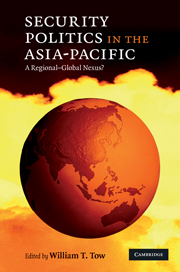Book contents
- Frontmatter
- Contents
- List of illustrations
- About the contributors
- Preface
- Acknowledgements
- List of abbreviations
- 1 Setting the context
- Part I
- 2 Grappling with an elusive concept
- 3 Asia-Pacific institutions
- 4 The United States: regional strategies and global commitments
- 5 A rising China and American perturbations
- Part II
- Part III
- Part IV
- References
- Index
4 - The United States: regional strategies and global commitments
Published online by Cambridge University Press: 05 June 2012
- Frontmatter
- Contents
- List of illustrations
- About the contributors
- Preface
- Acknowledgements
- List of abbreviations
- 1 Setting the context
- Part I
- 2 Grappling with an elusive concept
- 3 Asia-Pacific institutions
- 4 The United States: regional strategies and global commitments
- 5 A rising China and American perturbations
- Part II
- Part III
- Part IV
- References
- Index
Summary
Since the collapse of the Soviet Union and end of the Cold War, the global state system has been populated by one dominant power and several other important powers, none of which should rightly be characterised as a ‘peer competitor’ of the United States (Ikenberry 2002). The United States is the sole global power with the capacity to exert decisive influence across different regions of the world, diplomatically, economically and militarily. Its military spending far exceeds that of any other state or combination of states, and its military technology grants it effective control of the global commons (Posen 2003). The US economy, measured in terms of gross domestic product, remains more than twice as large as that of any other individual nation-state (Economist 2006b: 26). The European Union is collectively an economic peer of the United States, but lacks the degree of coherence and coordination in foreign and defence policy required for global power projection.
In terms of material capabilities we live, at least for now, in a unipolar system. As the United States has learned with difficulty in recent years, however, even a unipolar state cannot be everywhere, much less control events or simply dictate international outcomes. A unipolar state, just like any other state, does not always get what it wants and is forced to make choices and set priorities.
- Type
- Chapter
- Information
- Security Politics in the Asia-PacificA Regional-Global Nexus?, pp. 67 - 84Publisher: Cambridge University PressPrint publication year: 2009
- 2
- Cited by

